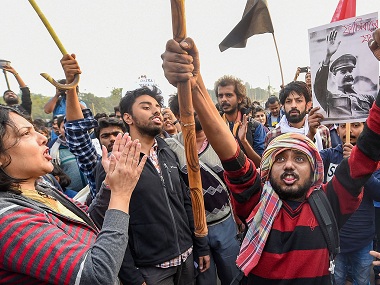Across the country, citizens have been gathering in large numbers over the last few days to protest against the Citizenship Amendment Act (CAA) and the National Register of Citizens (NRC). In several cities, including Delhi, Mumbai, Pune, Chennai and Kolkata, many stood in support of the students of Jamia Milia University and Aligarh Muslim University following incidences of alleged police brutality during protests. In a show of resistance, solidarity and dissent, protesters have composed thought-provoking verses, songs and poems questioning the government’s policy and decision-making. On 21 December, poet, lyricist and comedian Varun Grover voiced his dissent by tweeting a poem titled, ‘Kaagaz Nahi Dikhayenge’ (the NRC papers, we won’t show) He says: We will pitch our tents here, The NRC papers, we won’t show We will save the Constitution before we go, The NRC papers, we won’t show
In yet another verse, one of the protesters raising his voice against the CAA says, “Meri jaan ka faisla ek saat ghante ki sansad satra se ho, mujhe manzoor nahi”
In a protest at Jamila Milia University, a throng of women chants ‘Inquilab Zindabad’ to voice their dissent against the CAA.
Meanwhile, ‘ Write me down, I am an Indian ’ speaks up Ajmal Khan AT, a teacher at Ashoka University and Ambedkar University, drawing on the verses of Mahmoud Dariwsh’s ‘Write down! I am an Arab’ and Hafiz Ahmed’s ‘Write Down, I am a Miyah’
In another peaceful gathering in Bangalore, artists came together to translate and sing Faiz Ahmad Faiz’s revolutionary verse, Hum Dekhenge, in Kannada.
Protesters at Jantar Mantar in the capital city also took to singing popular verses such as ‘Saare Jahaan Se Achha, Hindostan Humara’
Pop culture references were also used by several of the citizens and students who were part of the protest marches including a spin on a quote from the movie Mean Girls that said, ‘Stop trying to make the NRC happen.’
All in a days work pic.twitter.com/PGy4wdYIaD
— namaah (@thehappyn00dle) December 19, 2019
In another scathing response to the violence that erupted in Delhi’s Jawaharlal Nehru University (JNU) on 5 January, filmmaker-musician Vishal Bhardwaj recited his anti-establishment poem at a protest on Mumbai’s Carter Road, surrounded by eminent film personalities.
‘Sab Bhulaya Jayega’ (from the ashes of Khajuri Khas), a poem shared by a Samar on Facebook, takes potshots at the temporariness of our public memory in view of the brutality unleashed in the Muslim-majority neighbourhoods of northeast Delhi. In the end, the poem leaves one with the eternal question: Will everything, indeed, be forgotten?


)
)
)
)
)
)
)
)
)



